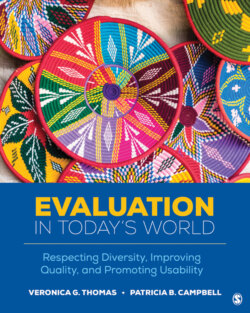Читать книгу Evaluation in Today’s World - Veronica G. Thomas - Страница 150
На сайте Литреса книга снята с продажи.
Donald T. Campbell.
ОглавлениеShadish and Luellen (2004) refer to Donald T. Campbell as the “accidental evaluator” given his central importance in the field of evaluation. While Campbell did not start out intending to be an evaluator, his dedication to understanding causality behavior and how to solve social questions led him to this field. The evaluation field came to embrace Campbell’s works, including “Reforms as Experiments” (1969) and Experimental and Quasi-Experimental Designs for Research (D. Campbell & Stanley, 1963), which were probably his most influential writings on evaluation methods (Rossi et al., 2004; Shadish & Epstein, 1987). According to Campbell (1994), “Reforms as Experiments” was his first publication targeting a program evaluation agenda. Campbell and Stanley’s (1963) work on research designs created an entirely new vocabulary for the taxonomy of research designs and illuminating validity issues (Rossi & Wright, 1984). Campbell introduced issues that made their way into thinking about evaluation findings. As is covered in detail in Chapter 11, these include concepts such as internal validity, external validity, and threats to validity. Campbell’s work was instrumental in making the randomized controlled trials (or designs), with their emphasis on net effects, the design of choice in program evaluations throughout the 1970s and 1980s. It is worth noting that Campbell and Stanley did put forth the quasi-experimental design option when that was all the situation allowed, thus allowing evaluators and other researchers to test hypotheses in less-than-ideal field settings.
Numerous scholars and practitioners have challenged Campbell’s “experimenting society” approach that called for use of experimental methods in evaluation. The major points of contention and conclusions, as summarized by Shadish and Luellen (2004), are that
experimental methods were insufficient to address social problems in a world where policy practice is entangled with politics, economy, and social pressures; questioned the importance of noncausal questions and nonexperimental methods; complained that experimentally based knowledge was not fully implemented in solving social problems; and pointed out limitations of experimental methods. Eventually, the field of evaluation rejected Campbell’s Experimenting Society as too narrow and Utopian, preferring a broader vision of the role of evaluation. Even so, because bias remains a central problem for evaluation, the solutions Campbell offered will be his greatest legacy. (pp. 82–83)
